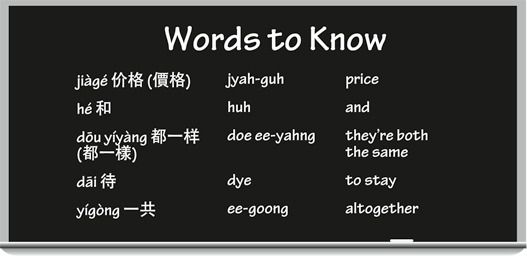Chinese For Dummies (124 page)
Read Chinese For Dummies Online
Authors: Wendy Abraham
 NÇmen shÅu bù shÅu xìnyòng kÇ?
NÇmen shÅu bù shÅu xìnyòng kÇ?
ä½ ä»¬æ¶ä¸æ¶ä¿¡ç¨å¡
? (
ä½ åæ¶ä¸æ¶ä¿¡ç¨å¡
?) (nee-men show boo show sheen-yoong kah?) (
Do you accept credit cards?
)
 WÇ yà o yÃge fángjiÄn zhù liÇng ge wÇnshà ng.
WÇ yà o yÃge fángjiÄn zhù liÇng ge wÇnshà ng.
æè¦ä¸ä¸ªæ¿é´ä½ä¸¤ä¸ªæä¸
. (
æè¦ä¸åæ¿éä½å
©åæä¸
.) (waw yaow ee-guh fahng-jyan joo lyahng guh wahn-shahng.) (
I'd like a room for two nights.
)
 YÇu méiyÇu shÄngwù zhÅngxÄ«n?
YÇu méiyÇu shÄngwù zhÅngxÄ«n?
æ没æåå¡ä¸å¿
? (
ææ²æååä¸å¿
?) (yo mayo shahng-woo joong-sheen?) (
Is there a business center?
)
When you do finally pick up your phone to reserve a room, make sure you have your credit card in front of you (refer to
Chapter 15
for more money talk).
Talkin' the Talk
 Eli calls a well-known hotel chain in Hong Kong to make a three-day reservation for his whole family. The hotel clerk quickly answers his call. (Track 26)
Eli calls a well-known hotel chain in Hong Kong to make a three-day reservation for his whole family. The hotel clerk quickly answers his call. (Track 26)
Eli:
QÇngwèn, nÇmen fángjiÄn de jià gé shì duÅshÇo?
cheeng-one, nee-men fahng-jyan duh jyah-guh shir dwaw-shaow?
May I ask, how much are your rooms?
Hotel clerk:
WÇmen de fángjiÄn yì tiÄn wÇnshà ng yì bÇi wÇ shà kuà i mÄi yuán.
waw-men duh fahng-jyan ee tyan wahn-shahng ee bye woo shir kwye may ywan.
Our rooms are USD $150 per night.
Eli:
Nà shì dÄnrén fángjiÄn hái shì shuÄngrén fángjiÄn de jià gé?
nah shir dahn-run fahng-jyan hi shir shwahng-run fahng-jyan duh jyah-guh?
Is that the price of a single room or a double?
Hotel clerk:
DÄnrén fángjiÄn hé shuÄngrén fángjiÄn de jià gé dÅu yÃyà ng.
dahn-run fahng-jyan huh shwahng-run fahng-jyan duh jyah-guh doe ee-yahng.
The prices of our single and double rooms are the same.
Eli:
HÇo jÃle. WÇ yà o liÇngge dÄnrén fángjiÄn yÃge shuÄngrén fángjiÄn.
how jee-luh. waw yaow lyahng-guh dahn-run fahng-jyan ee-guh shwahng-run fahng-jyan.
Great. I'd like two single rooms and one double.
Hotel clerk:
MéiyÇu wèntÃ. NÇmen yà o dÄi jÇ ge wÇnshà ng?
mayo one-tee. nee-men yaow dye jee guh wahn-shahng?
No problem. How many nights will you be staying?
Eli:
YÃgòng sÄn ge wÇnshà ng.
ee-goong sahn guh wahn-shahng.
Altogether, three nights.
Hotel clerk:
HÇo. Nà yÃgòng yìqiÄn sÄnbÇi wÇ shà kuà i.
how. nah ee-goong jyo bye kwye.
Very well. That will be $1,350 altogether.

 The coverb
The coverb
hé
å
(huh) (
and
), along with the noun that always follows it, precedes the main verb or adjective of a sentence. (What's a
coverb?
Basically, it's a word that's technically a verb but typically acts as a preposition.) Some synonyms of
hé
are
gÄn
è·
(gun),
yÇ
ä¸
(
è
) (yew), and
tóng
å
(toong), although
tóng
translates more closely as
with.
 Â Hotel or apartment?
 Hotel or apartment?
China's booming economy has become a magnet for foreign businesses, and scores of foreign business people have begun taking up residence there. Because living in mainland China can be quite expensive and nice apartments that don't come with long waiting lists are hard to come by, many foreigners opt to stay in a permanent hotel room or a serviced apartment connected to a foreign-run hotel. A friend of mine in Shanghai rents out his nice-sized apartment for around USD $2,000 per month, comparable to the rent of major U.S. cities like New York or Chicago. And you can expect the hotels to run at least $150 per night, just like in metropolitan U.S. cities.
Checking In Before You Hit the Pool
Before you can take advantage of any conveniences your hotel offers (flip to the following section), you have to officially
bà nlÇ rùzhù shÇuxù
åçå
¥ä½æç»
(
辦çå
¥ä½æçº
) (bahn-lee roo-joo show-shyew) (
check in
). You don't want to be caught red handed running in the gym
or relaxing in the hot tub unless you're a bona fide guest, right? (Don't answer that.)
When you walk up to the
fà ndià n qiántái
é¥åºåå°
(
飯åºåå°
) (fahn-dyan chyan-tye) (
reception desk
), you invariably find yourself needing to say one of the following sentences:
 NÇmen hái yÇu fángjiÄn ma?
NÇmen hái yÇu fángjiÄn ma?
ä½ ä»¬è¿ææ¿é´å
? (
ä½ åéææ¿éå
?) (nee-men hi yo fahng-jyan mah?) (
Do you have any rooms available?
)
 WÇ méiyÇu yùdìng fángjiÄn.
WÇ méiyÇu yùdìng fángjiÄn.
æ没æé¢å®æ¿é´
. (
ææ²æé å®æ¿é
.) (waw mayo yew-deeng fahng-jyan.) (
I don't have a reservation.
)